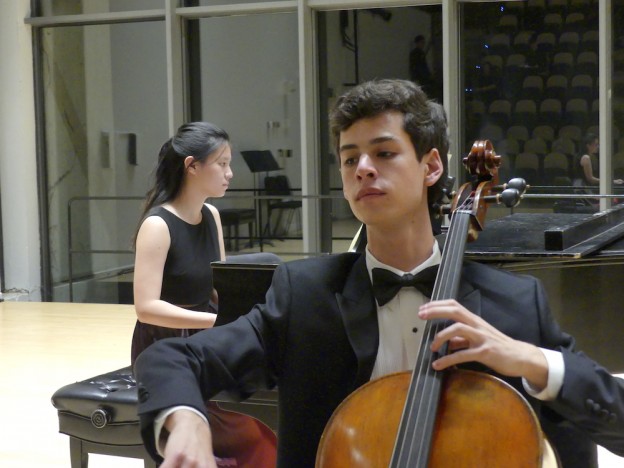As Swarthmore slowly crawls into springtime, bringing with it all-too-brief snatches of warmth, rain showers, and allergy attacks, dozens of students across campus are preparing for one of the most important musical events of the year: the Fetter concert series, which this spring will take place on April 12, April 28, and May 4.
Dr. Michael Johns is the coordinator and director of the Elizabeth Pollard Fetter Chamber Music Program; as he explains, the Pollard family’s history is closely tied to that of Swarthmore. Elizabeth Pollard Fetter ‘25 and her husband, Frank Whitson Fetter ‘20, funded the original program in 1975 in memory of Elizabeth’s mother, also an alumna (Emilie Garrett Pollard, class of 1893). Dr. Johns has been directing the program (originally known as the Pollard Scholarship Funds) “since it expanded to support the coaching of multiple chamber music groups in 2001.”
“One of my fondest memories is from 2004, the hundredth anniversary of Elizabeth Pollard Fetter,” says Dr. Johns. “ In cooperation with her family, we invited every former Fetter participant, going back to the program’s inception in 1975, to return to campus for a day of celebration. People came from all over…groups reformed; friendships were rekindled. The highlight of the day was the concluding concert, which featured a mass performance of Mendelssohn’s String Octet.”
This year’s concerts feature a variety of genres and groups, including string and saxophone quartets, piano trios, and jazz combinations. Reuben Gelley Newman ’21 will be singing with Critical Mass, Swarthmore’s medieval and Renaissance a cappella group. This semester, they will be performing “…a variety of liturgical music dedicated to the Virgin Mary: a piece of a 9th century Byzantine chant…a chant by 12th century mystic, abbess and composer Hildegard von Bingen…and the credo from the 14th century French composer Guillaume de Machaut’s Messe de Nostre Dame.”
This is Gelley Newman’s fourth semester performing with Critical Mass as part of the Fetter series. As he explains, “I love the joy of working with students and faculty on challenging and interesting music, especially since you don’t hear medieval and Renaissance music performed very often. I’m tremendously grateful to Professor James Blasina for helping us delve into the history and performance practice, and to get advice from the famed medieval music group Sequentia when they did a residency at Swarthmore last February.”
Another student, Eleanor Naiman ‘20, is performing Joaquin Turina’s Piano Trio no.2 in B minor, which she describes as “a short but beautiful piece written in 1933, that is both challenging and extremely fun to play.” Naiman describes how “…the Fetter program provides chamber music groups with professional coaches…while also giving us the opportunity to meet weekly by ourselves to develop our own interpretation of the music. Fetter has been one of the highlights of my time at Swarthmore. It has made me a better musician and has also led to some of my closest friendships.”
As for Dr. Johns, his favorite aspect of the program is “…hearing the growth of the ensembles through the rehearsal process. The emphasis is on quality, not quantity…the goal is not to simply pick a difficult piece and rehearse it until you can be reasonably confident that it won’t break down in performance; it is to go beyond the notes to a point where the players understand what the composer had in mind and intuit how the piece works, culminating in a performance that is a musical conversation.”
While the Fetter programs are, according to Dr. Johns, “geared toward students who have advanced beyond the beginning stages and reached a certain level of achievement,” and students are required to audition, the primary requirement is a passion for and desire to practice chamber music. Students of a variety of instruments are welcome, not limited to the Western chamber musical canon. This semester’s concerts will take place on Friday, April 12, at 8 pm; Sunday, April 28, at 3 pm; and Saturday, May 4, at 3 pm in Lang Concert Hall.
Emilie Hautemont ’20
